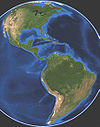Historia verdadera de la conquista de la Nueva España
This article needs additional citations for verification. (January 2008) |
OCLC 723180350 | | |
Historia verdadera de la conquista de la Nueva España (transl. The True History of the Conquest of New Spain) is a first-person narrative written in 1568
Late in life, when Díaz del Castillo was in his 60s, he finished his first-person account of the Spanish conquest of the West Indies and the Aztec Empire. He wrote The True History of the Conquest of New Spain to defend the story of the common-soldier conquistador within the histories about the Spanish conquest of the Aztec Empire. He presents his narrative as an alternative to the critical writings of
The history is occasionally uncharitable about Cortés, whom Díaz del Castillo felt had taken most of the glory for himself while intentionally ignoring the efforts of the other Spaniards and their indigenous allies.
Though Díaz del Castillo justifies his and the other Spaniards’ actions through the lens of a just war, he does express some regret over the destruction of Tenochtitlán, writing, "When I beheld the scenes around me, I thought within myself, this was the garden of the world. All of the wonders I beheld that day, nothing now remains. All is overthrown and lost."[5]
Unabridged translations
- The True History of the Conquest of Mexico by Captain Bernal Diaz del Castillo, translated by Maurice Keatinge, London, 1800
- The Memoirs of the Conquistador Bernal Díaz del Castillo (1844), translated by John Ingram Lockhart (2 volumes, 213 chapters with notes)[6]
- The True History of the Conquest of New Spain by Captain Bernal Díaz del Castillo, translated by Alfred Percival Maudslay. London, Hakluyt Society, 1908 (4 volumes, 17 parts, 214 chapters with appendices) from the only original copy published by Genaro García in Mexico with notes and appendices. Considered the most complete and authentic translation.[citation needed] An abridged version with deleted passages and 116 chapters was published in 1928 titled The Discovery and Conquest of Mexico 1517–1521
Notes
- ^ "The Project Gutenberg eBook of the memoirs of the conquistador Bernal Diaz del Castillo written by himself, containing a true and full account of the discovery and conquest of Mexico and New Spain (Vol. 1 of 2)".
- ^ "Bernal Díaz del Castillo | Conquistador, Historian, Mexico | Britannica". www.britannica.com. 2024-02-27. Retrieved 2024-04-02.
- ^ "The Project Gutenberg eBook of the memoirs of the conquistador Bernal Diaz del Castillo written by himself, containing a true and full account of the discovery and conquest of Mexico and New Spain (vol. 1 of 2)". www.gutenberg.org. Retrieved 2024-04-02.
- ^ "The Project Gutenberg eBook of the memoirs of the conquistador Bernal Diaz del Castillo written by himself, containing a true and full account of the discovery and conquest of Mexico and New Spain (vol. 1 of 2)". www.gutenberg.org. Retrieved 2024-04-02.
- ^ "The Project Gutenberg eBook of the memoirs of the conquistador Bernal Diaz del Castillo written by himself, containing a true and full account of the discovery and conquest of Mexico and New Spain (vol. 1 of 2)". www.gutenberg.org. Retrieved 2024-04-03.
- ISBN 978-90-272-6940-9.
References
- OCLC 162351797.
External links
- Historia verdadera de la conquista de la Nueva España. Tomo I, facsimile of 1939 edition, with introduction and notes by Joaquín Ramírez Cabañas, published in Mexico City by Pedro Robredo; reproduced online at the Biblioteca Virtual Miguel de Cervantes (Alicante, Spain, 2005) (in Spanish)
- Historia verdadera de la conquista de la Nueva España, online reproduction by Biblioteca Virtual Antorcha, based on the 1961 Fernández Editores edition, published in Mexico City (in Spanish)
 Historia verdadera de la conquista de la Nueva España public domain audiobook at LibriVox
Historia verdadera de la conquista de la Nueva España public domain audiobook at LibriVox

